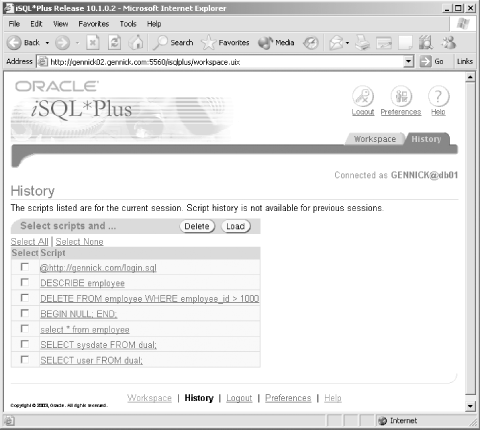iSQL*Plus Command History
Sometimes you may want to return and review what you've done. You may have executed a SQL statement five minutes ago and want to execute it again. You may wonder just what WHERE conditions you really had in that DELETE you just executed against a critical table. i SQL*Plus makes reviewing your past work easy. Click the History tab near the upper right of the page and you'll see a history listing such as what is shown in Figure 3-14.
Figure 3-14. Reviewing what you've recently done

Everything in the history list is referred to as a script . However, in this context, a script is nothing more than the contents of the Workspace text box when you clicked the Execute button. Thus, if you execute a remote script using a command such as @http:// gennick .com/login.sql , the script shown on the History page will be the @ command and not the contents of login.sql .
Scripts, or commands, are listed in reverse order of execution, with the most recently executed script at the top of the list. The most recently executed script in Figure 3-14 is the execution of login.sql . Prior to that was a DESCRIBE command against the employee table. Prior to that was a DELETE from employee .
You can delete scripts from the history list, although I'm not sure why you'd want to bother doing that, and you can load scripts back into the Workspace text box for review and possible re-execution. To delete scripts from the history, check the ones you want to get rid of, and then click the Delete button.
To load a single script, click on the link for that script. To load multiple scripts, check those that you wish to load and click the Load button. Usually, you'll want to load only one script. If you load multiple scripts, they will be placed in the text box, one following the other, in the order in which they were listed on the History page. You cannot affect the order in which multiple scripts are loaded.
